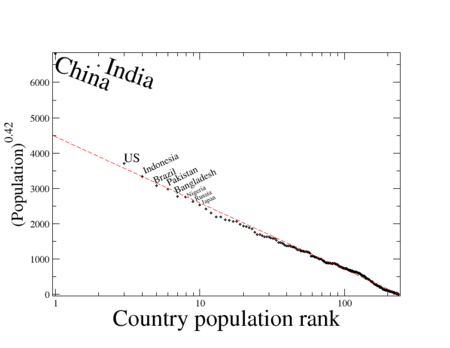King effect

In statistics, economics, and econophysics, the King effect refers to the phenomenon where the top one or two members of a ranked set show up as outliers. These top one or two members are unexpectedly large because they do not conform to the statistical distribution or rank-distribution which the remainder of the set obeys.
Distributions typically followed include the power-law distribution,[2] that of a stretched exponential,[1][3] or a parabolic fractal.
The King effect has been observed in the distribution of :
- French city sizes (where the point representing Paris is the "King", failing to conform to the stretched exponential[1]), and similarly for other countries with a primate city, such as the United Kingdom (London), and the extreme case of Bangkok (see list of cities in Thailand)
- popularity of musicians,[3] (where Cliff Richard and Elvis Presley are the outliers not fitting on a stretched exponential)
- country populations (where only the points representing China and India fail to fit a stretched exponential[1]).
Note, however, that the King effect is not limited to outliers with a positive evaluation attached to their rank: for rankings on an undesirable attribute, there actually may exist a Pauper effect, with a similar detachment of extremely ranked data points from the reasonably distributed portion of the data set.
See also
References
- 1 2 3 4 "Stretched exponential distributions in nature and economy: "fat tails" with characteristic scales", J. Laherrère and D. Sornette
- ↑ "A power law tail in India's wealth distribution: Evidence from survey data", Arjun Jayadev
- 1 2 "The individual success of musicians, like that of physicists, follows a stretch exponential", J.A. Davies